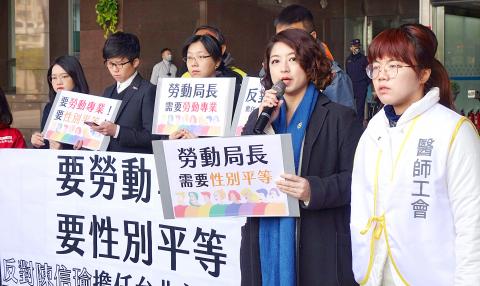Unions and gender equality groups yesterday rallied in front of Taipei City Hall to protest the appointment of Chen Hsin-yu (陳信瑜) as director of the Taipei Department of Labor, citing concern about Chen’s purported stance against homosexuality.
Chen, a former Kaohsiung City councilor for the Democratic Progressive Party, is scheduled to take office today.
Chen has been known for her opposition to education materials that teach about same-sex relationships and while it would be detrimental to judge her solely on past remarks, less than one month ago she said she did not regret that decision, Marriage Equality Platform convener Jennifer Lu (呂欣潔) said.

Photo: Fang Pin-chao, Taipei Times
Appointing this kind of person to a position related to gender equality affairs is troubling, Lu said.
Groups opposed to the appointment said they were concerned as the labor director post brings with it membership in the Taipei Women’s Rights Promotion Committee, the department’s Gender Equality Association and the Department of Education’s Association for Gender Equality Education, as well as the convener of the Review Committee for Vocational Discrimination.
The groups called for the appointment of another person through a transparent nomination processes.
Taipei Doctors’ Union Secretary-General Liao Yu-wen (廖郁雯) said that information on the appointment process or nomination committee was not available on the city’s Web site, adding that no outside opinions were consulted during the process.
Taipei Mayor Ko Wen-je (柯文哲) prides himself on being transparent and involving the public in his decisions, but he has failed to live up to his promises, Liao said.
In 2014, Ko said that city residents should choose their department of labor director, and Lai Hsiang-ling (賴香伶) was appointed to the position after 19,956 residents voted.
However, after the Jan. 11 legislative elections, Lai became a legislator-at-large in waiting for Ko’s Taiwan People’s Party.
Taipei City Councilor Miao Po-ya (苗博雅) said that the city government’s neglect in informing unions and other groups of the appointment process means it was not a “transparent nomination.”
Citing a 2016 vocational survey of homosexual Taiwanese, Department of Labor Gender Equality Committee member Hsu Chia-wei (許家瑋) said 60 percent found the Taiwanese vocational environment unfriendly and were afraid of “outing” themselves.
Hsu said Chen’s appointment would waste Lai’s efforts to ameliorate those concerns.
Chen’s anti-homosexual stance could affect the municipality’s ability to uphold the law, Fight for Gender Equality secretary-general Chou Yu-hsuan (周于萱) said.
“The municipality could use technicalities to bar homosexual couples from applying for leave for marriage, caring for children and receiving paid leave for giving birth,” Chou said.
Taipei Deputy Mayor Tsai Ping-kun (蔡炳坤) said Chen had been selected from numerous candidates.
Chen comes from a family of laborers, worked in the Kaohsiung City Government for seven years and was a city councilor for 14 years, Tsai said, adding that in that time Chen had never wavered in her concern for and promotion of labor rights.
Ko intends to create a mutually-inclusive society, and has pushed for LGBT-friendly work environments, he said, adding that the Department of Labor will continue to promote these issues.
Chen’s personal beliefs would not hinder her job to promote these matters, Tsai said.

Chinese spouse and influencer Guan Guan’s (關關) residency permit has been revoked for repeatedly posting pro-China videos that threaten national security, the National Immigration Agency confirmed today. Guan Guan has said many controversial statements in her videos posted to Douyin (抖音), including “the red flag will soon be painted all over Taiwan” and “Taiwan is an inseparable part of China,” and expressing hope for expedited reunification. The agency last year received multiple reports alleging that Guan Guan had advocated for armed reunification. After verifying the reports, the agency last month issued a notice requiring her to appear and explain her actions. Guan

GIVE AND TAKE: Blood demand continues to rise each year, while fewer young donors are available due to the nation’s falling birthrate, a doctor said Blood donors can redeem points earned from donations to obtain limited edition Formosan black bear travel mugs, the Kaohsiung Blood Center said yesterday, as it announced a goal of stocking 20,000 units of blood prior to the Lunar New Year. The last month of the lunar year is National Blood Donation Month, when local centers seek to stockpile blood for use during the Lunar New Year holiday. The blood demand in southern Taiwan — including Tainan and Kaohsiung, as well as Chiayi, Pingtung, Penghu and Taitung counties — is about 2,000 units per day, the center said. The donation campaign aims to boost

The Kaohsiung Tourism Bureau audited six hotels in an effort to prevent price gouging ahead of Korean band BTS’ concert tour in the city scheduled for Nov. 19, 21 and 22 this year. The bureau on Friday said that the audits — conducted in response to allegations of unfair pricing posted on social media — found no wrongdoing. These establishments included the local branches of Chateau de Chine, Hotel Nikko, My Humble House, and Grand Hai Lai, it said, adding that the Consumer Protection Commission would have penalized price gougers had the accusations been substantiated. The bureau said the Tourism Development Act

The Central Weather Administration (CWA) said a magnitude 4.9 earthquake that struck off the coast of eastern Taiwan yesterday was an independent event and part of a stress-adjustment process. The earthquake occurred at 4:47pm, with its epicenter at sea about 45.4km south of Yilan County Hall at a depth of 5.9km, the CWA said. The quake's intensity, which gauges the actual effects of a temblor, was highest in several townships in Yilan and neighboring Hualien County, where it measured 4 on Taiwan's seven-tier intensity scale, the CWA said. Lin Po-yu (林柏佑), a division chief at the CWA's Seismological Center, told a news conference